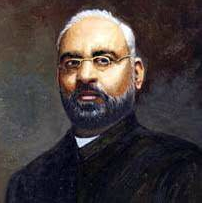Important Facts For Prelims
Shyamji Krishna Varma
- 05 Oct 2021
- 3 min read
Why in News
The Prime Minister paid tributes to revolutionary freedom fighter Shyamji Krishna Varma on his birth anniversary (4th October).
Key Points
- Shyamji Krishna Varma was born on 4th October, 1857 in Mandvi town of Kachchh district of Gujarat.
- He was an expert in Sanskrit and other languages.
- His deep knowledge of the Sanskrit language caught the attention of Monier Williams, a professor of the subject in Oxford University.
- He was inspired by Bal Gangadhar Tilak, Swami Dayanand Saraswati and Herbert Spencer.
- He founded the Indian Home Rule Society, India House and The Indian Sociologist in London.
- Indian Home Rule Society and the India House worked towards inspiring youngsters in Britain to take up revolutionary activities against their own representatives in India.
- The monthly Indian Sociologist became an outlet for nationalist ideas and through the Indian Home Rule Society, he criticised the British rule in India.
- Varma became the first President of Bombay Arya Samaj. He inspired Veer Savarkar who was a member of India House in London. Verma also served as the Divan of a number of states in India.
- Swami Dayanand Saraswati was the founder of the Hindu reform organisation Arya Samaj.
- He was a barrister in London, when in 1905, he was barred from practising law by the Inner Temple following charges of sedition for writing against the colonial government.
- The move was significant as the Honourable Society of the Inner Temple is one of the four professional associations for barristers and judges in London.
- He was posthumously reinstated by the Inner Temple in 2015 after the Inn’s governing council noted that Varma “did not receive an entirely fair hearing”.
- In the face of criticism by the British, Varma shifted his base from England to Paris and continued his movement.
- After the outbreak of the First World War (1914-18), however, he moved to Geneva in Switzerland and spent the rest of his life there. He died on 30th March, 1930.





